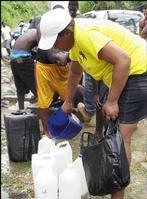By Ayanna Kirton, Staff Reporter 
Residents on Norbrook Road in St. Andrew gather water after Hurricane Ivan. - Ian Allen/Staff Photographer
NOW THAT Hurricane Ivan has turned its path of destruction north-ward, memories of the system remain fresh in the minds of many Jamaicans as they endure what appears to be an extended period without the basic utilities of electricity and water.
Many have had to resort to the more traditional methods of lighting their homes through the use of candles, flashlights and trusty kerosene lamps until electricity is restored while others, particularly those households with higher levels of disposable income, possess fuel generators for power generation.
If you're in the market for a generator, because of the current situation it might be very difficult to find one. According to most suppliers, the current demand for generators is extremely high as the majority of households and businesses across the island still do not have electricity.
However, if you are able to find one, Laurie Stewart, managing director for Arel, distributors of the FG Wilson brand of diesel generators, suggests that buyers must choose between the cost of the generator and the long life of the generator.
DIESEL VS GASOLINE
According to Mr. Stewart,
gas-powered generators are less costly while diesel, though more expensive, last longer and possess an additional benefit in that the fuel used is far less volatile when compared with gasoline.
Whether you choose a diesel generator or one powered by gas, Mr. Stewart provides the following tips for getting the best results from your generator:
Secure a steady supply of fuel, enough to last for at least two days after a hurricane. Once gas stations are open for business ensure that you secure a reasonable amount.
Take great care in handling fuel and never refuel a generator that is hot or running as this poses a severe fire risk.
Match the power load with the generator. "It's important not to overload capacity, a small generator can't do a big job," says Mr. Stewart.
Place your generator away from occupied areas of your house. "You have to ensure that exhaust fumes are not carried into the house," cautions Mr. Stewart. "Because carbon monoxide kills silently, you must never run a generator inside a building. Always put it outside in an unoccupied space such as a garage or car port."
It is important to use a properly certified changeover switch or extension cords. "Many people use generators by plugging a male connector into a wall socket to get to house wiring, this places JPSCo workers at risk as generators can feed back into the power grid causing a electric shock, so a changeover switch is very important," says Mr. Stewart.
Have your generator professionally installed to avoid any mishaps. Arel installs over 80 per cent of the generators they sell for both household and industrial use.
COST
Overall, generator prices are in the range of $50,000 for a small household generator, $400,000 for a large household or small industrial machine and up to $1 million for a large industrial generator in a weather proof container.
Water storage
Water storage is also critical during this period, as water has become a scare resource since Hurricane Ivan disrupted the electricity powered water distributions systems across the island. In addition to purchasing storage containers in the form of buckets, coolers, or even garbage containers, some households are now considering purchasing water tanks as a precautionary measure to guarantee a generous supply of water in the event of future catastrophes and periods of drought. Paul Cozier, general manager for Rototech International, manufacturers of Rhino Tanks, says in a country like Jamaica where disruptions to the water supply are frequent, a water tank is essential. Rototech's Rhino Tanks are made of FDA approved linear low density ploy ethyl or LLDPE. This resin is approved for the storage of potable water. The cost of the tanks vary according to weight and not storage capacity as the taller the tank the thicker it will be to ensure stability. Rhino Tanks have a seven-year warranty but can last for as long as 25 years if properly maintained, says Mr. Cozier.
Average households usually opt for 400-gallon tanks, which along with the 600-gallon tanks are Rototech's fastest sellers. "These tanks can satisfy the needs of a 5-6 member households adequately in normal situations for standby use in periods where there are short disruptions in supply", says Mr. Cozier who indicates that the current situation facing most households in Jamaica now would be categorised as an abnormal situation. In order to determine the tank size ideal for your household or business, Mr. Cozier suggests calculating the number of gallons you may use on average based on the following indicators:
An average shower uses up 3 gallons of water per minute, therefore a 10 minute shower = 30 gallons of water.
Toilet flushing =3 gallons per flush
Kitchen taps = 3-5 gallons per minute.
Cost
The prices of Rhino Tanks are as follows:
200 gallon = $3,400 plus 400 gallon = $4,900
650 gallon = $7,300
1000 gallon = $14,400
2,000 gallon (industrial purposes) = $35,200
Installation costs vary depending on the placement of the tank on your property.













